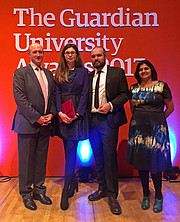Annuncio
La campagna "Pale Red Dot" vince ai Guardian University Awards
30 Marzo 2017
Il successo della campagna Pale Red Dot (Piccolo Punto Rosso) [1] è stato riconosciuto in gran stile la scorsa notte quando la Queen Mary University of London, l’istituzione che ha condotto la campagna [2], ha vinto nella categoria “Impatto sulla ricerca” ai Guardian University Awards 2017. La campagna Pale Red Dot era un progetto di diffusione [3] creato per fornire al pubblico una visione unica e in tempo reale di come funziona la scienza. Il programma scientifico mirava a identificare pianeti simili alla Terra intorno a Proxima Centauri, la stella più vicina al Sistema Solare. Il premio ha sottolineato l’importante contributo dato dalla campagna nel portare le scienze di ultima generazione a un pubblico ampio e non specializzato.
La campagna è stata lanciata nel gennaio del 2016, quando sono iniziate le osservazioni di Proxima Centauri, usando i telescopi dell’ESO come, tra gli altri [4], lo spettrografo HARPS a La Silla, in Cile. La ricerca è durata fino ad aprile 2016 ed è stata accompagnata da post sul blog e da aggiornamenti sui social network, tramite Facebook e Twitter. I rapporti erano accompagnati da numerosi articoli di diffusione scritti da specialisti di tutte le parti del mondo. Seguendo le osservazioni, gli scienziati hanno analizzato i dati nella speranza di trovare ciò che cercavano. Nell’agosto del 2016 è stata annunciata la scoperta: avevano trovato un esopianeta!
Progetti innovativi di diffusione come questo continuano a ispirare e ad affascinare il pubblico, avvicinandolo all'entusiasmo per le nuove scoperte e sottolineando come si sviluppa il processo scientifico.
Note:
[1] Il nome "Pale Red Dot" si riferisce alla famosa citazione di Carl Sagan che vedeva la Terra come un puntino azzuro. Poichè Proxima Centauri è una stella nana rossa, inonderà i suoi pianeti di un riverbero rossastro.
[2] L'equipe di astronomi che ha condotto le osservazioni e la campagna di diffusione è composto da: Guillem Anglada-Escudé, Gavin Coleman, John Strachan (Queen Mary University of London, Regno Unito), James Jenkins (Universidad de Chile, Cile), Cristina Rodriguez-Lopez, Zaira M. Berdinas, Pedro J. Amado (Instituto de Astrofisica de Andalucia/CSIC), Julien Morin (Universite de Montpellier, Francia), Mikko Tuomi (Centre for Astrophysics Research/University of Hertfordshire, Regno Unito), Yiannis Tsapras (Heidelberg/LCOGT, Astronomisches Rechen-Institut – Heidelberg & LCOGT) e Christopher J. Marvin (University of Goettingen).
[3] La campagna di diffusione è stata coordinata dall'equipe del progetto con il supporto del dipartimento di divulgazione dell’ESO, della Queen Mary University of London, dell’Instituto de Astrofisica de Andalucia/CSIC, dell’Université de Montpellier, dell’University of Goettingen, dell’Universidad de Chile e del Las Cumbres Observatory Global Telescope Network.
[4] Oltre ai dati della campagna Pale Red Dot, altri contributi sono stati dati da scienziati che hanno osservato Proxima Centauri per molti anni, come i membri del progetto originale UVES/ESO M-dwarf (Martin Kürster and Michael Endl) o da pionieri della ricerca di esopianeti, quali R. Paul Butler. Sono anche state inserite osservazioni fatte dal team HARPS di Ginevra, raccolte durante molti anni.
Ulteriori informazioni:
Questa ricerca è presentata in un articolo intitolato “A terrestrial planet candidate in a temperate orbit around Proxima Centauri” di Anglada-Escudé et al., che è apparso nella rivista Nature il 25 agosto 2016.
Links
- Annuncio dei vincitori ai Guardian University Award
- Articolo scientifico su Nature
- Blog di Pale Red Dot
- Comunicato stampa della QMUL
- Comunicato stampa dell’ESO
Contatti
Guillem Anglada-Escudé (Lead Scientist)
Queen Mary University of London
London, United Kingdom
Tel: +44 (0)20 7882 3002
Email: g.anglada@qmul.ac.uk
Peter Grimley
ESO Assistant Public Information Officer
Garching bei München, Germany
Tel: +49 89 3200 6383
Email: pgrimley@partner.eso.org
Riguardo all'annuncio
| Identificazione: | ann17013 |
Our use of Cookies
We use cookies that are essential for accessing our websites and using our services. We also use cookies to analyse, measure and improve our websites’ performance, to enable content sharing via social media and to display media content hosted on third-party platforms.
ESO Cookies Policy
The European Organisation for Astronomical Research in the Southern Hemisphere (ESO) is the pre-eminent intergovernmental science and technology organisation in astronomy. It carries out an ambitious programme focused on the design, construction and operation of powerful ground-based observing facilities for astronomy.
This Cookies Policy is intended to provide clarity by outlining the cookies used on the ESO public websites, their functions, the options you have for controlling them, and the ways you can contact us for additional details.
What are cookies?
Cookies are small pieces of data stored on your device by websites you visit. They serve various purposes, such as remembering login credentials and preferences and enhance your browsing experience.
Categories of cookies we use
Essential cookies (always active): These cookies are strictly necessary for the proper functioning of our website. Without these cookies, the website cannot operate correctly, and certain services, such as logging in or accessing secure areas, may not be available; because they are essential for the website’s operation, they cannot be disabled.
Functional Cookies: These cookies enhance your browsing experience by enabling additional features and personalization, such as remembering your preferences and settings. While not strictly necessary for the website to function, they improve usability and convenience; these cookies are only placed if you provide your consent.
Analytics cookies: These cookies collect information about how visitors interact with our website, such as which pages are visited most often and how users navigate the site. This data helps us improve website performance, optimize content, and enhance the user experience; these cookies are only placed if you provide your consent. We use the following analytics cookies.
Matomo Cookies:
This website uses Matomo (formerly Piwik), an open source software which enables the statistical analysis of website visits. Matomo uses cookies (text files) which are saved on your computer and which allow us to analyze how you use our website. The website user information generated by the cookies will only be saved on the servers of our IT Department. We use this information to analyze www.eso.org visits and to prepare reports on website activities. These data will not be disclosed to third parties.
On behalf of ESO, Matomo will use this information for the purpose of evaluating your use of the website, compiling reports on website activity and providing other services relating to website activity and internet usage.
Matomo cookies settings:
Additional Third-party cookies on ESO websites: some of our pages display content from external providers, e.g. YouTube.
Such third-party services are outside of ESO control and may, at any time, change their terms of service, use of cookies, etc.
YouTube: Some videos on the ESO website are embedded from ESO’s official YouTube channel. We have enabled YouTube’s privacy-enhanced mode, meaning that no cookies are set unless the user actively clicks on the video to play it. Additionally, in this mode, YouTube does not store any personally identifiable cookie data for embedded video playbacks. For more details, please refer to YouTube’s embedding videos information page.
Cookies can also be classified based on the following elements.
Regarding the domain, there are:
- First-party cookies, set by the website you are currently visiting. They are stored by the same domain that you are browsing and are used to enhance your experience on that site;
- Third-party cookies, set by a domain other than the one you are currently visiting.
As for their duration, cookies can be:
- Browser-session cookies, which are deleted when the user closes the browser;
- Stored cookies, which stay on the user's device for a predetermined period of time.
How to manage cookies
Cookie settings: You can modify your cookie choices for the ESO webpages at any time by clicking on the link Cookie settings at the bottom of any page.
In your browser: If you wish to delete cookies or instruct your browser to delete or block cookies by default, please visit the help pages of your browser:
Please be aware that if you delete or decline cookies, certain functionalities of our website may be not be available and your browsing experience may be affected.
You can set most browsers to prevent any cookies being placed on your device, but you may then have to manually adjust some preferences every time you visit a site/page. And some services and functionalities may not work properly at all (e.g. profile logging-in, shop check out).
Updates to the ESO Cookies Policy
The ESO Cookies Policy may be subject to future updates, which will be made available on this page.
Additional information
For any queries related to cookies, please contact: pdprATesoDOTorg.
As ESO public webpages are managed by our Department of Communication, your questions will be dealt with the support of the said Department.


